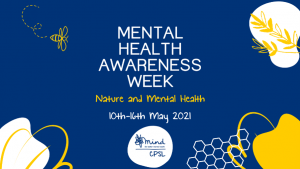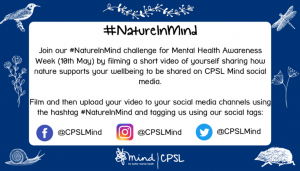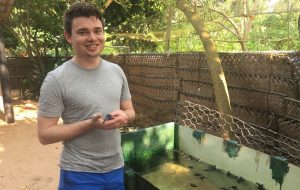Mental Health Awareness Week – The importance of nature
10th May 2021
This blog piece was written by Rob Earl, Campaigns and Communications Lead at mental health charity, Cambridgeshire, Peterborough and South Lincolnshire (CPSL) Mind.
Mental Health Awareness Week (MHAW) is an important date in the diary for us at Cambridgeshire, Peterborough and South Lincolnshire (CPSL) Mind as we strive to promote positive mental health for all in our community. It is a great opportunity for us to shine a spotlight on the support which we offer all year round and to get more people involved in looking after their own wellbeing and supporting others. The theme for MHAW 2021 is nature!

On a personal level, this presents an unmissable opportunity to combine two of my biggest passions – mental health and supporting our environment – and only offers further incentive for us as a charity to continue making strides in becoming as environmentally sustainable as possible. Nature and our environment are inextricably linked to our mental and physical wellbeing, just as we are to the wellbeing of our planet.
We know that spending time in green spaces or being around plants and animals can have a hugely beneficial impact on us as humans. It has been proven to lift our mood, reduce feelings of stress or anger, help us relax, boost confidence and support us to feel more connected. In my role, I hear countless examples of people whose mental health has been positively affected after they began outdoor activities such as gardening, exercising or interacting with wildlife. You can also bring nature indoors by growing plants or caring for a pet.
From personal experience, making time each day to go for a walk and appreciate my natural surroundings has a hugely positive affect on me. Connecting with nature by strolling round local lakes and wildlife areas is so peaceful to me and lets my thoughts settle. Hearing the birds sing and seeing nature thriving is really cathartic.
Unfortunately, though, seeing the impact that humans are having on our planet can have the opposite effect, creating eco-anxiety. This is certainly the case for me as someone who is aware of the climate change crisis and it can be overwhelming. Fortunately, there are positive steps we can take to help preserve our climate. For me, increasing my understanding and going vegan was a big step in helping me feel closer to living in harmony with our environment and the animals we share our planet with. Did you know that removing meat and dairy products from your diet can reduce your carbon footprint by up to 73%?[Reference]
We can also take individual steps such as using greener transport and renewable energy, being more efficient in how we heat our homes, recycling and reducing waste. At CPSL Mind, as an organisation we are also striving to make our services and facilities as eco-friendly as possible. Feeling hopeful about the future of our planet and empowered to make changes to protect it is really important to our wellbeing.
Given the relationship between nature and mental health, it is no surprise that services are beginning to incorporate the link more and more into treatment and support. Ecotherapy (a type of treatment which involves doing activities outside in nature) has shown it can help with mild to moderate depression and is one of a number of options we are exploring at CPSL Mind as face-to-face contact becomes possible. Our Good Life Fund has already provided support in starting up several nature-based community wellbeing activities.
This Mental Health Awareness Week, we’re encouraging everyone in our community to embrace their local surroundings and boost their mental health by spending time in nature. As part of our messaging, we are asking people to follow the #NatureInMind hashtag on social media and tag us @cpslmind in sharing how nature supports their mental health. It would be great if you could get involved!

If you’re looking for mental health support at this time, please do take a look at our services at CPSL Mind which range from informal opportunities to connect with others to talking therapies and crisis support. Keep Your Head is also a fantastic directory of local and national services.
In an emotional or mental health crisis, in Cambridgeshire and Peterborough, you can contact the NHS First Response Service 24 hours a day, seven days a week by calling 111 and selecting option 2. For more helplines, see this page.

Rob Earl is Campaigns and Communications Lead at CPSL Mind. He’s pictured here on a sea turtle conservation programme in Sri Lanka
Main Image: Hampton, Peterborough
